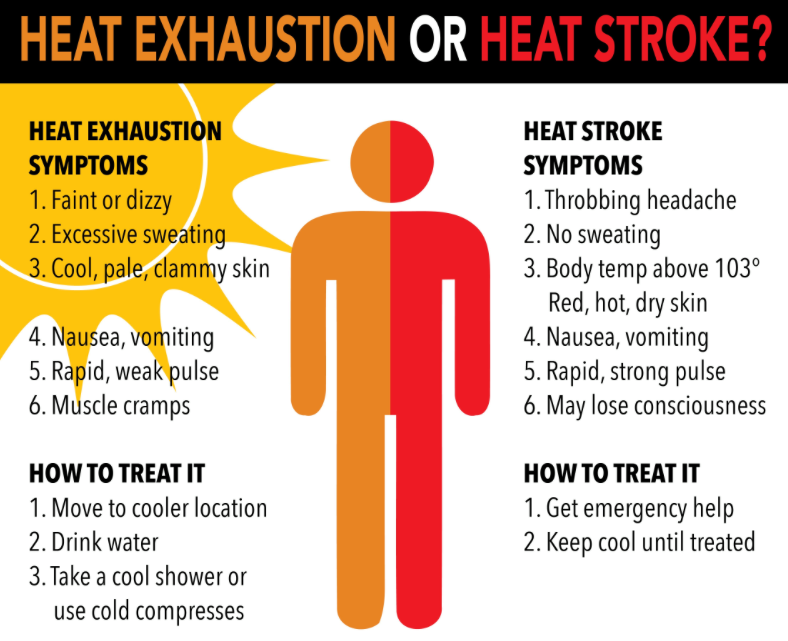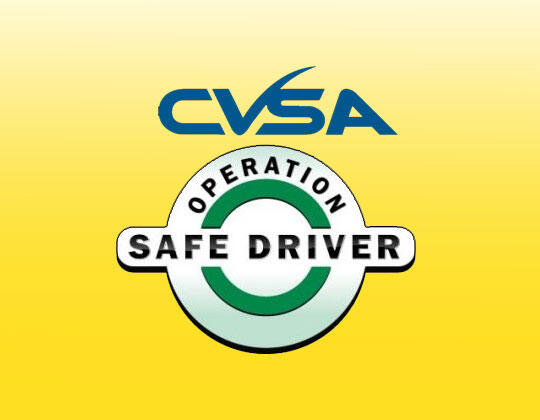The Heat is On!
Read the latest Idealease safety bulletin below or access the entire bulletin here. Remember to sign up for the weekly bulletin and receive it directly in your inbox! Stay informed on the latest safety news, tips, and information!
In This Issue:
- Preventing Heat Related Illness
- Brake Safety Week
Preventing Heat Related Illness

The crazy weather this summer continues, the heat is setting record temperatures across North America. Let's take a deeper look into how heat affects drivers. What are you doing to protect your employees from heat stroke and exhaustion?
These conditions are created when our body is unable to regulate our heat production at a safe level. First, we need to make all our employees aware of the signs and symptoms for these conditions:
- Fatigue, weakness, fainting
- Nausea and vomiting
- Headache
- Dizziness
- Muscle cramps
- Irritability
- Sweating (absence or presence)
- Paleness
These conditions can be further escalated by the physical condition of your employees. Those with heart disease, skin diseases, extensive burns, endocrine disorders (hyperthyroidism, diabetes, etc.), high blood pressure, overweight, depression, insomnia, and fever are at higher risk for heat-related illnesses. Over-the-counter drugs can also contribute to a greater risk for these conditions.
How to Prevent Heat-Related Illnesses
- Limit your exposure to direct sunlight as much as possible.
- Drink more fluids (non-alcoholic); do not drink fluids that contain caffeine or large amounts of sugar. Sports drinks are good as they replace electrolytes and salt in your body. Avoid extremely cold fluids as these can cause stomach cramps. Drink often throughout the day 4-6 ounces at a time. STAY HYDRATED!
- Wear lightweight, light-colored, loose-fitting clothing that does not create a safety hazard for your work environment. If outdoors, wear a hat to reduce direct exposure to the sun.
- Make sure your employees are wearing sunglasses that provide UV protection and are impact resistant
- Avoid hot foods and heavy meals, they add heat to your body.
- Drivers who are on routes should pack a cooler with water for the day. Also, keep an umbrella in the truck if you are operating in extreme conditions, (desolate, desert, etc.), this adds protection from the sun.
- Always apply SPF, even if you will mostly be indoors!
- Make sure your truck is in excellent condition. A good pre-trip inspection is crucial in extreme heat conditions to prevent breakdowns, otherwise, you may find yourself and your unit on the side of the road exposed to the extreme heat.
CVSA Break Safety Week
August 21-27, 2022

Brake Safety Week is held annually to ensure commercial motor vehicle brake safety inspection, enforcement, and education initiative. Brake Safety Week is conducted by law enforcement jurisdictions in Canada, Mexico, and the U.S. Inspectors will conduct their usual North American Standard Level I and V Inspections and capture and report brake-related data to CVSA. The results will be released in the fall.
Brake-related violations comprise the largest percentage of all out-of-service vehicle violations cited during roadside inspections. According to last year’s three-day International Roadcheck data, brake systems and brake adjustment violations accounted for 38.9% of all vehicle out-of-service violations, most of any category of vehicle violations. To address this, CVSA’s Brake Safety Week seeks to:
- Identify and remove commercial motor vehicles with critical vehicle inspection violation items identified in the North American Standard Out-of-Service Criteria from roadways.
- Conduct inspections and identify and acknowledge commercial motor vehicles that do not have critical vehicle inspection violations by affixing those vehicles with a CVSA decal.
- Encourage proactive vehicle maintenance in advance of the week.
- Highlight the hard work and commitment to safety by inspectors, drivers and motor carriers.
- Remind drivers and motor carriers about the importance of proper brake maintenance and vehicle pre-trip and post-trip inspections.
- Provide an opportunity for outreach and educational brake-safety efforts by inspectors.
CVSA "Operation Safe Driver Week"
July 10-16, 2022

Throughout Operation Safe Driver Week, law enforcement personnel will be on the lookout for commercial motor vehicle drivers and passenger vehicle drivers engaging in risky driving. Identified unsafe drivers will be pulled over and issued a citation or warning. Data shows that traffic stops and interactions with law enforcement help reduce problematic driving behaviors. By contacting drivers during Operation Safe Driver Week, law enforcement personnel aim to make our roadways safer by targeting high-risk driving behaviors.
https://www.cvsa.org/program/programs/operation-safe-driver/operation-safe-driver-week/
FMCSA Seeks Input on Definitions of Broker, Bona Fide Agent
The Federal Motor Carrier Safety Administration has published a notice seeking public comment on the definitions of broker and bona fide agents for motor carriers. In the infrastructure law, Congress directed the agency to issue new guidance to clarify these terms.
Currently, a broker is defined in 49 U.S.C. 13102(2) as a “person, other than a motor carrier or an employee or agent of a motor carrier, that as a principal or agent sells, offers for sale, negotiates for, or holds itself out by solicitation, advertisement, or otherwise as selling, providing, or arranging for, transportation by the motor carrier for compensation.” It is also defined in 49 CFR 371.2(a) as a “person who, for compensation, arranges, or offers to arrange, the transportation of property by an authorized motor carrier.”
Motor carriers, or persons who are employees or bona fide agents of carriers, are not brokers within the meaning of this section when they arrange or offer to arrange the transportation of shipments that they are authorized to transport and which they have accepted and legally bound themselves to transport.
In that same section, bona fide agents are defined as “persons who are part of the normal organization of a motor carrier and perform duties under the carrier’s directions under a preexisting agreement which provides for a continuing relationship, precluding the exercise of discretion on the part of the agent in allocating traffic between the carrier and others.” 49 CFR 371.2(b).
The notice asks for comment on several questions involving the use of dispatch services to book freight shipments, including whether a dispatch service that services multiple carriers is acting as a broker. It also asks when a dispatch service should be considered a bona fide agent.
The notice also references electronic bulletin boards that match shippers and carriers for a fee. The fee is a membership fee to have access to the bulletin board information. The question is, should electronic bulletin boards be considered brokers and be required to register with FMCSA to obtain broker operating authority?
*The Idealease Safety Bulletin is provided for Idealease locations and their customers and is not to be construed as a complete or exhaustive source of compliance or safety information. The Idealease Safety Bulletin is advisory in nature and does not warrant, guarantee, or otherwise certify compliance with laws, regulations, requirements, or guidelines of any local, state, or Federal agency and/or governing body, or industry standards.
